Yuquan Temple and Iron Pagoda: A Journey Through Ancient Chinese Architecture
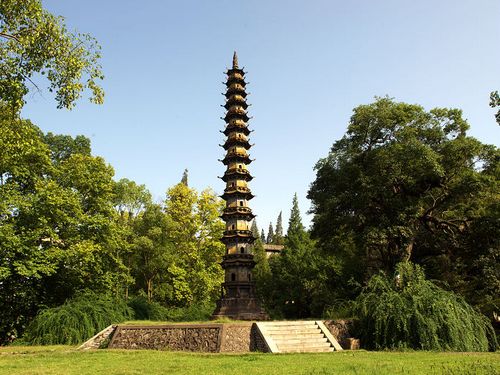
An Essential Guide to Visiting Yuquan Temple And Iron Pagoda
In This Guide
- An Essential Guide to Visiting Yuquan Temple And Iron Pagoda
- The Rich History and Legends of Yuquan Temple And Iron Pagoda
- Main Highlights: What You Absolutely Can’t Miss
- Planning Your Visit: A Practical Guide
- Tickets: Prices, Booking, and Tips
- How to Get There: A Complete Transportation Guide
- Local Cuisine and Accommodation Nearby
- Frequently Asked Questions
- Final Thoughts on Your Trip
Nestled within the lush embrace of Yuquan Mountain in Hubei Province, the Yuquan Temple and its magnificent Iron Pagoda offer an enchanting glimpse into China’s rich tapestry of history, culture, and spirituality. This serene sanctuary, just 10 kilometers west of Dangyang City, is a treasure trove for those eager to explore the profound legacies of Buddhism and the historical significance of the Three Kingdoms period.
Dating back to the late Eastern Han Dynasty, Yuquan Temple stands as a testament to the enduring spirituality of the Tiantai Sect of Buddhism, which finds its roots here. As you wander through the temple grounds, the soothing chants of ancient scriptures merge with the rustle of towering trees, creating a harmonious atmosphere that beckons contemplation and reflection. Among the temple’s many treasures are the revered iron wok from the Sui Dynasty and a remarkable stone statue of Guanyin, skillfully carved by the renowned artist Wu Daozi during the Tang Dynasty.
The Iron Pagoda, a striking prism-shaped structure constructed during the Northern Song Dynasty, is not only the tallest and heaviest of its kind in China but also a marvel of architectural ingenuity. Standing proudly for over a millennium, it has withstood the test of time, much like the legendary tales surrounding Guan Yu, a revered figure from the Three Kingdoms. According to folklore, the spirit of Guan Yu has manifested at Yuquan Mountain, with a cylindrical stone tablet marking his divine appearances.

Yuquan Temple And Iron Pagoda.
As you embark on your journey through this enchanting landscape, prepare to be captivated by the intertwining of nature, history, and spirituality. Whether you’re hiking the scenic trails, sipping tea in the tranquil gardens, or simply soaking in the breathtaking views, a visit to Yuquan Temple and the Iron Pagoda promises to be a profoundly enriching experience.
The Rich History and Legends of Yuquan Temple And Iron Pagoda
Nestled in the verdant embrace of Yuquan Mountain, the Yuquan Temple and the majestic Iron Pagoda stand as enduring symbols of China’s rich cultural heritage. This area, steeped in history, is not only a place of worship but also a sanctuary of legends that date back to the Eastern Han Dynasty.
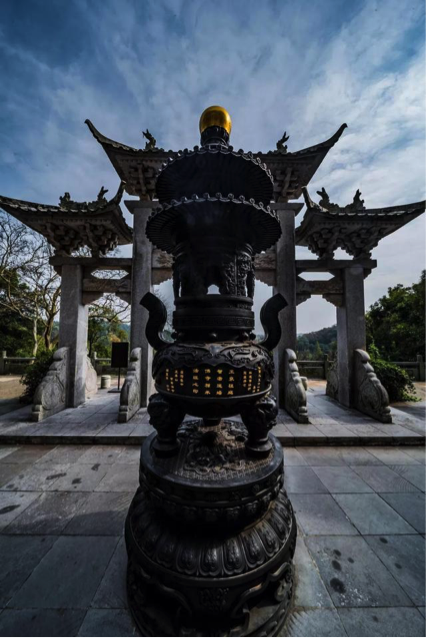
Yuquan Temple And Iron Pagoda.
A Historical Overview
The Yuquan Temple was established during the late Eastern Han Dynasty, around the 2nd century AD. It holds the esteemed position as one of the ancestral temples of the Tiantai Sect of Buddhism, a significant school that has shaped Buddhist thought throughout China. The temple was notably the dojo of Master Zhizhe, the founder of this revered sect. Visitors can marvel at the temple’s numerous cultural relics, including an ancient iron wok from the Sui Dynasty and a stunning stone statue of Guanyin, crafted by the renowned Tang Dynasty artist Wu Daozi. These artifacts not only showcase exquisite craftsmanship but also serve as testaments to the temple’s long spiritual lineage.
The Iron Pagoda: A Marvel of Engineering
Dominating the landscape is the Iron Pagoda, a remarkable architectural feat built during the Northern Song Dynasty (960-1127 AD). Standing as the tallest, heaviest, and best-preserved iron pagoda in China, its unique prism-like structure has withstood the test of time, embodying both aesthetic beauty and engineering prowess. With a history spanning over a thousand years, the pagoda is a focal point for pilgrims and history enthusiasts alike. Its intricate design and robust construction reflect the advanced metallurgical techniques of the era, making it a national treasure.
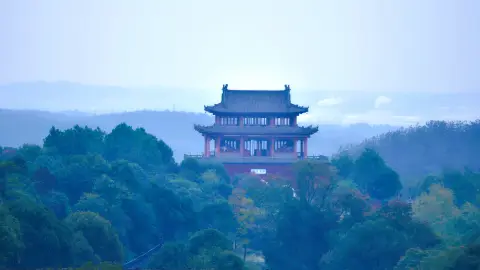
Yuquan Temple And Iron Pagoda.
Legends and Lore
The temple and pagoda are not merely historical sites; they are steeped in mythology and folklore. Perhaps the most famous legend associated with this area involves the revered general Guan Yu, a central figure in the historical novel Romance of the Three Kingdoms. According to local lore, after his demise, Guan Yu is said to have made several divine apparitions at Yuquan Mountain, blessing the temple and its surroundings. A stone tablet erected during the Ming Dynasty at the foot of the mountain commemorates these sightings, inscribed with the phrase “Guan Gong’s first appearance of saints.” Adjacent to this tablet rests the Guan Yu grindstone, a large stone that locals believe was used by Guan Yu himself, adding to the site’s mystique.
Visitors can explore paths leading to numerous “Guan Gong’s appearance of saints” markers, each a testament to the general’s enduring legacy. These legends not only enrich the historical narrative of the temple but also draw countless pilgrims who seek blessings and guidance.
Cultural Significance
Yuquan Temple and the Iron Pagoda are not just relics of the past; they continue to play a vital role in the spiritual and cultural life of the region. The temple serves as a tranquil retreat for meditation and reflection, inviting visitors to engage with its serene environment. The surrounding natural landscape, rich in biodiversity with towering ancient trees and gentle streams, enhances the temple’s role as a sanctuary for both the body and soul.
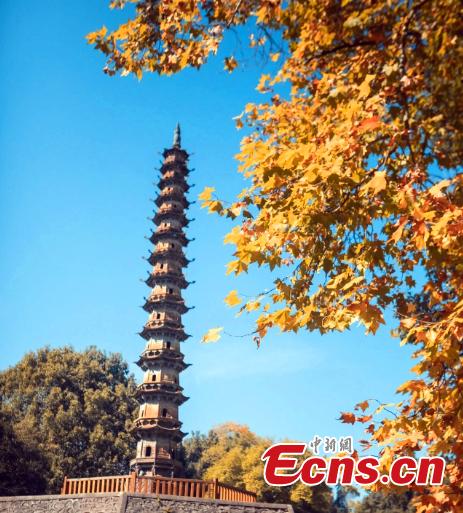
Yuquan Temple And Iron Pagoda.
Conclusion
A visit to Yuquan Temple and the Iron Pagoda is more than a mere sightseeing experience; it is an immersion into the profound depths of Chinese history and spirituality. As you wander through this sacred space, you are not only walking in the footsteps of monks and pilgrims from centuries past but also embracing the legends and stories that continue to resonate in this tranquil haven. Whether you are a history buff, a spiritual seeker, or simply a lover of nature, the rich history and legends of Yuquan Temple and the Iron Pagoda promise an unforgettable journey into the heart of China’s cultural legacy.
Main Highlights: What You Absolutely Can’t Miss
Discover the Essence of Yuquan Temple and Iron Pagoda
Yuquan Temple and the Iron Pagoda are not merely sites to visit; they are gateways into the rich tapestry of Chinese history and culture. Nestled within the verdant embrace of Yuquan Mountain in Dangyang City, Hubei Province, these attractions offer a stunning blend of natural beauty, religious significance, and historical intrigue. Here’s what you absolutely cannot miss during your visit.
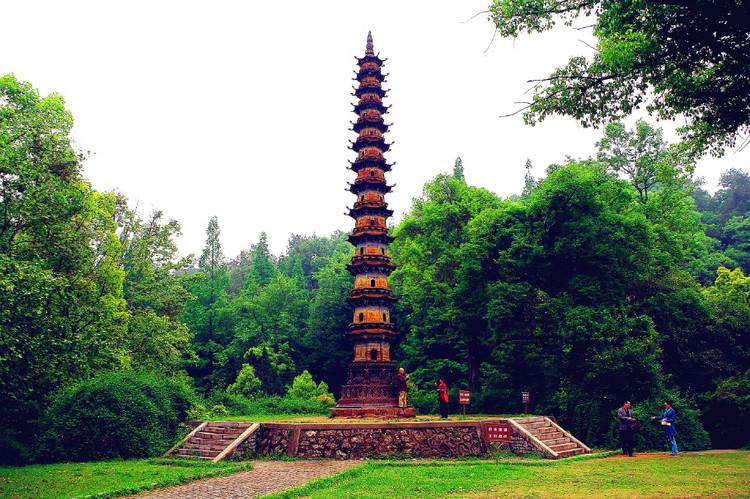
Yuquan Temple And Iron Pagoda.
1. Yuquan Temple: A Pillar of Buddhist Heritage
- Historical Significance: Established during the Eastern Han Dynasty, Yuquan Temple is one of the four ancestral temples of the Tiantai Sect of Buddhism. Its tranquil surroundings and ancient architecture provide a serene backdrop for spiritual reflection.
- Iconic Relics: Be sure to explore the temple’s precious artifacts, including the iron wok from the Sui Dynasty and a stone statue of Guanyin, skillfully carved by the renowned Tang Dynasty artist Wu Daozi.
- Cultural Atmosphere: The temple’s peaceful ambiance is punctuated by the soothing sounds of chanting monks and the fragrant incense wafting through the air. This setting is perfect for those seeking solace or spiritual rejuvenation.
2. The Majestic Iron Pagoda
- Architectural Marvel: The Iron Pagoda, built during the Northern Song Dynasty, stands as the tallest, heaviest, and best-preserved iron pagoda in China. Its impressive structure is a testament to the ingenuity of ancient Chinese architecture.
- Historical Context: With over a millennium of history, the pagoda not only serves as a stunning visual landmark but also as a cultural symbol of the era’s artistic and engineering prowess.

Yuquan Temple And Iron Pagoda.
3. Pearl Spring: A Natural Wonder
- Unique Phenomenon: Known as one of the “Three Great Pearl Springs in China,” Pearl Spring is famous for its bubbling waters that resemble pearls when clapped or stomped upon. Witnessing this natural spectacle is a must for every traveler.
- Peaceful Surroundings: The spring is surrounded by lush greenery and tranquil streams, making it an ideal spot for relaxation and contemplation.
4. The Rich Tapestry of the Three Kingdoms
- Historical Depth: Yuquan Mountain is steeped in legends from the “Romance of the Three Kingdoms.” The stone tablet at the mountain’s foot commemorates the appearances of the legendary warrior Guan Yu, adding a layer of intrigue to your visit.
- Cultural Significance: Explore the various monuments and relics related to Guan Yu, including the “Guan Yu grindstone,” which serve as reminders of the enduring legacy of this renowned figure in Chinese history.
5. Natural Beauty and Scenic Trails
- Breathtaking Landscapes: The forested landscape around Yuquan Mountain boasts a remarkable 85% tree coverage, offering fresh air and a delightful escape from urban life. Walking trails throughout the area lead you through picturesque settings, ideal for photography or quiet reflection.
- Wildlife Encounters: As you explore, keep an eye out for local wildlife and the seasonal beauty of the forest, which transforms with each passing season.
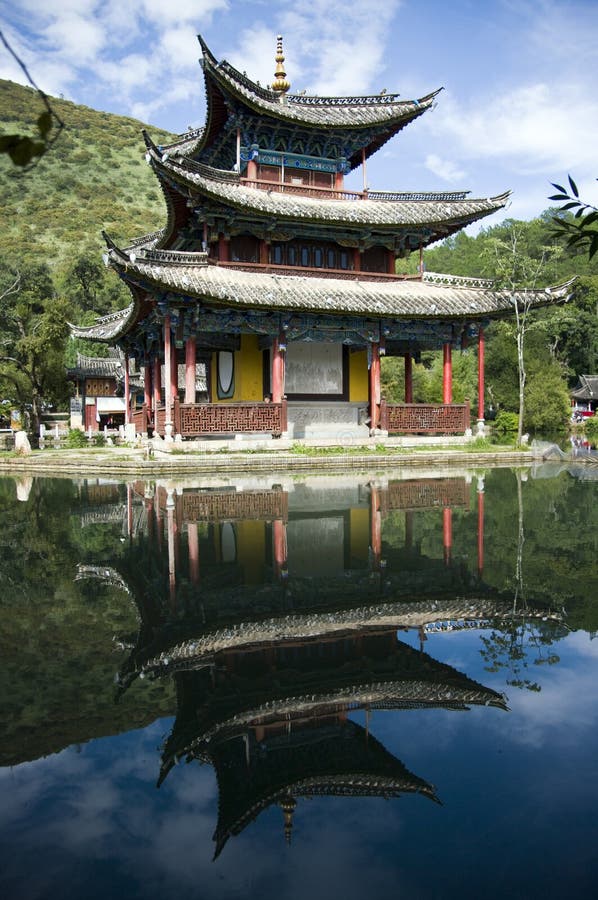
Yuquan Temple And Iron Pagoda.
Tips for Your Visit
- Duration: Plan to spend at least 2-3 hours to fully absorb the sights and sounds of this tranquil area.
- Accessibility: The site is free to enter, but consider a small fee for parking. Accessible by car or local bus, it is easy to reach from nearby cities.
- Culinary Delights: Don’t miss the opportunity to sample delicious vegetarian meals available at the temple’s restaurant, offering a taste of Buddhist culinary traditions.
- Cultural Experiences: Engage in activities such as Zen tea tasting or meditation sessions to deepen your connection with the serene environment.
Conclusion
A visit to Yuquan Temple and Iron Pagoda is more than just a sightseeing trip; it’s an immersion into the heart of Chinese culture, history, and spirituality. Whether you are drawn by the allure of ancient architecture, the tranquility of nature, or the rich stories of the past, these highlights promise an unforgettable experience that resonates long after your visit.
Planning Your Visit: A Practical Guide
Planning Your Visit to Yuquan Temple and Iron Pagoda
Embark on a journey to Yuquan Temple and the Iron Pagoda, a splendid fusion of history, culture, and stunning natural landscapes in the heart of Hubei Province. Nestled on the picturesque Yuquan Mountain, this site is a treasure trove for any traveler interested in Chinese Buddhist heritage and the rich narratives of the Three Kingdoms.
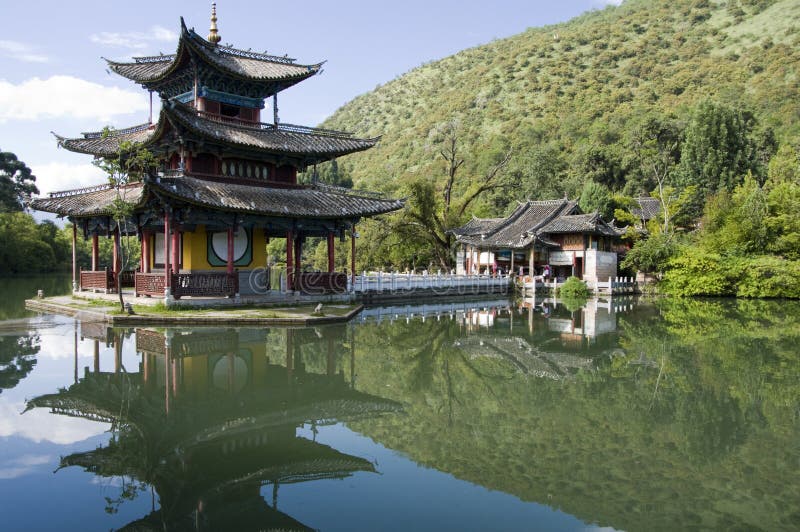
Yuquan Temple And Iron Pagoda.
Getting There
Location:
Yuquan Temple and Iron Pagoda are located about 10 kilometers west of Dangyang City, Yichang, Hubei Province.
Transportation Options:
– By Car: A scenic drive along G348 National Highway will bring you to the temple. After turning left at the traffic light onto Yuquan Road, drive straight for approximately 4 kilometers.
– By Bus: Local transport options are available; it is advisable to check local schedules for specific routes leading to Yuquan Mountain Scenic Area.
Admission and Opening Hours
- Entrance Fee: Free of charge.
- Opening Hours: Open daily from 08:00 AM to 08:30 PM.
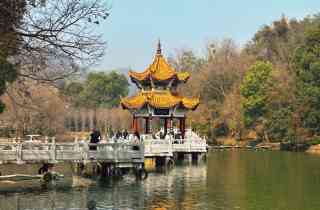
Yuquan Temple And Iron Pagoda.
What to See
Must-Visit Attractions:
– Yuquan Temple: Founded during the Eastern Han Dynasty, this temple is a cornerstone of the Tiantai Sect of Buddhism and houses numerous significant relics, including an iron wok from the Sui Dynasty and a Guanyin statue carved by the renowned artist Wu Daozi during the Tang Dynasty.
– Iron Pagoda (Lingjin Iron Pagoda): A marvel of ancient architecture, this Northern Song Dynasty iron pagoda is the tallest, heaviest, and best-preserved of its kind in China, standing as a testament to the ingenuity of ancient builders.
– Pearl Spring: Known for its folklore, this spring bubbles in an enchanting manner when clapped at, rumored to have been unearthed by Guan Yu’s legendary steed.
Suggested Itinerary
- Duration: Plan to spend about 2-3 hours exploring the area.
- Activities:
- Start with a visit to the temple, absorbing the serene atmosphere and the chants of Buddhist scriptures.
- Take a leisurely stroll through the gardens, pausing at the various statues and relics along your path.
- Capture stunning photographs at the Iron Pagoda and the tranquil Pearl Spring.
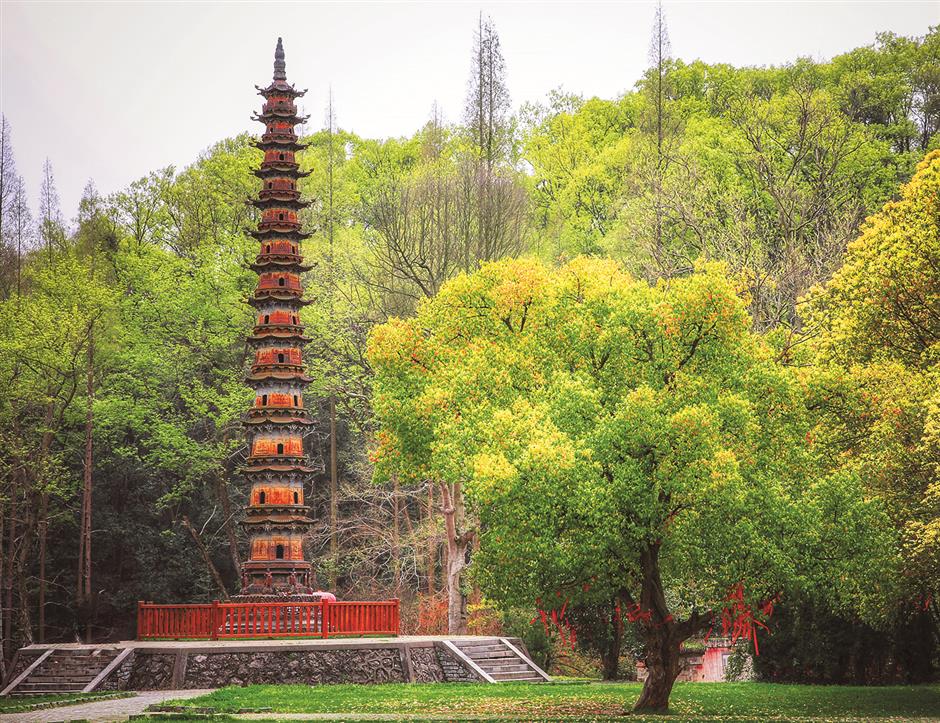
Yuquan Temple And Iron Pagoda.
Dining Options
While there are no formal dining facilities directly at the temple, nearby eateries offer local specialties such as Guochang Chicken and Changbanpo Flower Rice. For a unique experience, enjoy vegetarian meals available at the temple, celebrated for their wholesome and delicious offerings.
Tips for Your Visit
- Attire: Wear comfortable walking shoes, as the temple grounds and surrounding areas are best explored on foot. Consider sun protection clothing, especially during the warmer months.
- Photography: Bring your camera! The picturesque settings of the temple, pagoda, and surrounding landscapes provide perfect backdrops for memorable photos.
- Cultural Etiquette: Be respectful of the religious practices observed by temple-goers. A quiet demeanor enhances the experience for everyone.
Accommodation
For those wishing to extend their stay, consider the Shanyusi B&B, which features architecture inspired by the Song Dynasty, offering a tranquil retreat in a forest setting. Visitors can engage in tea ceremonies, meditation, and other cultural activities, enhancing their immersion in the local heritage.
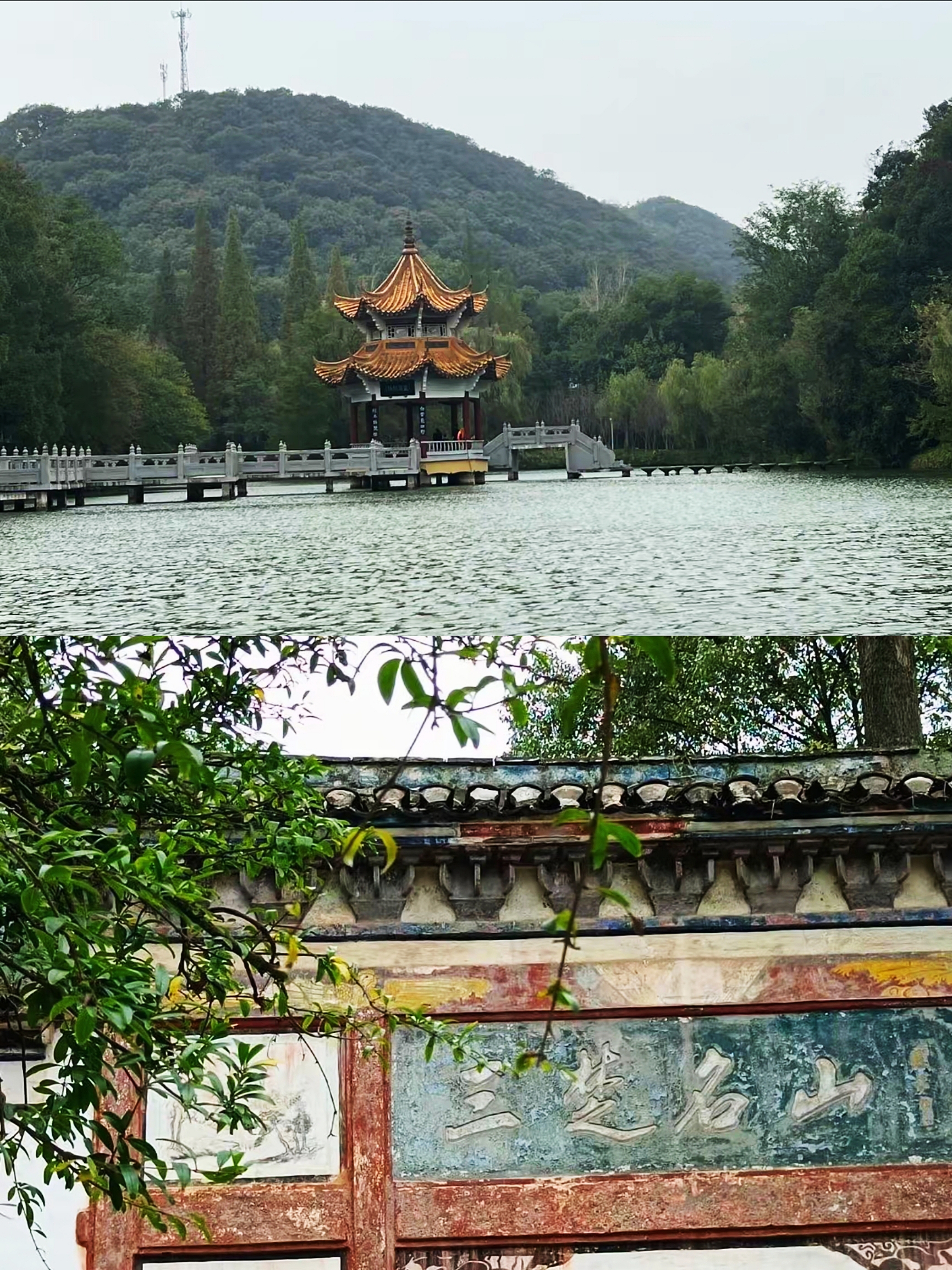
Yuquan Temple And Iron Pagoda.
Final Thoughts
A visit to Yuquan Temple and the Iron Pagoda is more than just a sightseeing trip—it’s a step into the depths of Chinese history and culture. Whether you’re drawn to the spiritual ambiance, the historical significance, or simply the beauty of nature, this destination promises an enriching experience that resonates long after your visit.
Tickets: Prices, Booking, and Tips
Discovering the Beauty of Yuquan Temple and Iron Pagoda
Visiting Yuquan Temple and the Iron Pagoda is a journey into China’s rich history and serene landscapes. As you plan your trip to this historical site, here’s everything you need to know about ticketing, booking, and some handy tips to enhance your experience.
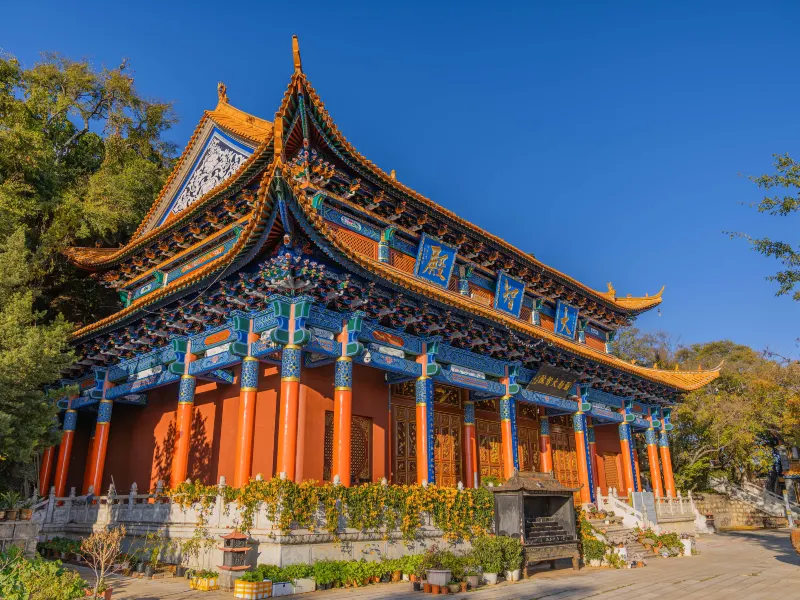
Yuquan Temple And Iron Pagoda.
Entry Fee
- Admission Price: Free
- Parking Fee: ¥10 (approximately $1.50) for those driving to the site.
This remarkable accessibility allows visitors from around the globe to explore the cultural and historical treasures of Yuquan Temple and the Iron Pagoda without the burden of an entrance fee.
Opening Hours
- Year-Round: 08:00 AM – 08:30 PM
These generous hours make it easy for travelers to visit either early in the morning to enjoy the tranquility or later in the afternoon when the setting sun casts a golden hue over the surroundings.
Recommended Duration of Visit
- Suggested Time: 1 to 3 hours
Depending on your interest level, you can spend anywhere from a quick hour to a leisurely three hours exploring the temple, the pagoda, and the stunning natural landscape that envelops them.
Booking Information
- Pre-booking: Not required for general admission.
- Group Tours: If you are traveling with a group or wish to have a guided experience, consider booking a local tour in advance, which may include transportation and a knowledgeable guide to deepen your understanding of the site’s history.
Travel Tips
- What to Wear: Comfortable walking shoes are essential, as the area includes some hiking and walking paths. Sun protection clothing and hats are advisable, especially in the warmer months.
- Dining Options: The nearby area offers local specialties, including vegetarian meals at the temple. Expect to pay around ¥20 (about $3) for a satisfying meal.
- Best Time to Visit: Early mornings or late afternoons provide not only a more serene atmosphere but also the best light for photography.
- Cultural Etiquette: Be respectful in your interactions, especially in sacred spaces. Observe the local customs, such as bowing at the temple and maintaining a quiet demeanor.
- Photography: The picturesque settings—including the ancient architecture and lush landscapes—offer fantastic opportunities for photography, so make sure to have your camera ready.
Exploring Yuquan Temple and the Iron Pagoda promises to be a memorable experience filled with history, spirituality, and natural beauty. Whether you’re a history buff or simply seeking a peaceful retreat in nature, this destination has something to offer everyone.
How to Get There: A Complete Transportation Guide
Getting to Yuquan Temple and Iron Pagoda
Visiting the historic Yuquan Temple and the iconic Iron Pagoda is an enriching experience for any traveler interested in Chinese history and culture. Nestled within the serene landscapes of Yuquan Mountain in Dangyang City, Hubei Province, this locale is accessible through a variety of transportation options. Here’s a comprehensive guide to help you reach this hidden gem with ease.
By Air
The nearest major airport to Yuquan Temple is Yichang Sanxia Airport (YIH), located approximately 50 kilometers away. This airport serves both domestic and some international flights. From the airport, you have a couple of options:
- Taxi: The most convenient option. The journey takes about 1 hour and costs around ¥150-200.
- Airport Shuttle: Check local schedules for shuttles that may take you to downtown Yichang, where you can catch a bus or taxi to Dangyang.
By Train
Dangyang Railway Station is well-connected to major cities such as Wuhan and Yichang. Here’s how to proceed:
- From Wuhan: Board a high-speed train from Wuhan Railway Station to Dangyang. The journey takes about 1.5 hours.
- From Yichang: Trains run frequently from Yichang East Railway Station to Dangyang, taking about 30-40 minutes.
Once you arrive at Dangyang Railway Station, you can take a taxi or a local bus to reach Yuquan Temple.
By Bus
If you prefer to travel by bus, here’s what you need to know:
- From Yichang: Take a bus from the Yichang Long Distance Bus Station to Dangyang. Buses run regularly, and the journey takes around 1 hour.
- From Wuhan: There are also buses available from the Wuhan Long Distance Bus Station to Dangyang, which take approximately 2-3 hours.
Upon arrival at Dangyang’s bus station, taxis are readily available to take you to the Yuquan Mountain Scenic Area.
By Car
For those who enjoy the freedom of driving, renting a car is a great option:
- From Yichang: Take the G348 National Highway. The drive is approximately 1 hour (about 50 km). Look for signs leading to Yuquan Mountain Scenic Area, and turn left at the traffic light onto Yuquan Road, continuing straight for about 4 km.
- From Wuhan: The drive takes about 2.5 hours via the G4 Beijing-Hong Kong-Macau Expressway. Follow the directions to arrive at Dangyang, and then head to the scenic area.
Local Transportation
Once you reach the Yuquan Mountain Scenic Area:
- Parking: Parking is available at the entrance for a nominal fee of around ¥10.
- Walking: The scenic area is best explored on foot. The pathways are well-marked, and you’ll enjoy the natural beauty as you make your way to the temple and the Iron Pagoda.
Travel Tips
- Admission: Entry to Yuquan Temple and the surrounding area is free. However, be mindful of any local fees for parking or specific attractions.
- Best Time to Visit: Aim for early morning or late afternoon to avoid crowds and enjoy a more tranquil atmosphere.
- Dress Comfortably: Wear comfortable shoes and bring sun protection, as exploring the temple grounds may involve some walking.
With its rich history, stunning landscapes, and spiritual atmosphere, reaching Yuquan Temple and the Iron Pagoda is an adventure worth embarking on. Whether you choose to travel by air, train, bus, or car, your journey will be filled with opportunities to appreciate the cultural heritage of this remarkable site.
Local Cuisine and Accommodation Nearby
When visiting the enchanting Yuquan Temple and Iron Pagoda, immerse yourself not only in history and culture but also in the delightful local cuisine and comfortable accommodations that enhance your experience. Here, we present some recommendations to enrich your journey.
Local Cuisine
The area surrounding Yuquan Mountain is known for its authentic Hubei flavors, offering a delectable range of dishes:
-
Guochang Chicken: A local specialty, Guochang Chicken is renowned for its tender meat and rich flavors, often prepared with fragrant spices and vegetables. Don’t miss the opportunity to savor this dish at nearby eateries.
-
Changbanpo Flower Rice: This unique dish features rice infused with the essence of local flowers, providing a delicate taste and aromatic experience. It’s a perfect accompaniment to the region’s hearty meals.
-
Temple Vegetarian Cuisine: While at Yuquan Temple, indulge in the delicious vegetarian meals offered within the temple grounds. Priced around ¥20 per person, these dishes are not only nutritious but also reflective of Buddhist culinary traditions, allowing you to savor the quiet spirituality of the environment.
Accommodation Options
For a truly immersive experience, consider staying in one of the charming accommodations near Yuquan Temple, where you can enjoy the tranquil beauty and cultural richness of the area:
Shanyusi B&B
- Description: Nestled in a scenic setting, Shanyusi B&B features architecture inspired by the Song Dynasty, characterized by yellow walls and black tiles. This homestay offers a serene atmosphere, making it the perfect retreat for those seeking harmony and relaxation.
- Experience: Guests can enjoy activities like tea picking, yoga in the tea garden, and mindfulness meditation, which enrich the stay with cultural and wellness experiences.
Grand Joy Wild – Mountain and Temple (Dangyang Store)
- Description: This elegant accommodation is surrounded by lush forests and is designed with a minimalist aesthetic that embodies the tranquility of Zen living.
- Amenities: The facility includes ten charming buildings set in a peaceful landscape, with opportunities for tea ceremonies, scripture copying, and meditation sessions.
Sanchu Bookstore Café
- Description: While not a traditional accommodation, this cozy café offers light meals and a reading area ideal for unwinding after a day of exploration.
- Experience: Enjoy a cup of locally sourced tea or coffee while browsing through books that delve into the rich history and culture of the region.
Conclusion
Whether you are indulging in the local culinary delights or retreating to a peaceful accommodation, your visit to Yuquan Temple and the Iron Pagoda will be a memorable experience. Embrace the harmony of nature and culture in this captivating part of Hubei, and let the flavors and hospitality of the region enhance your journey.
Frequently Asked Questions
Frequently Asked Questions
1. What is Yuquan Temple and why is it significant?
Yuquan Temple, located in the Yuquan Mountain Scenic Area near Dangyang City, Hubei Province, is a Buddhist temple that dates back to the late Eastern Han Dynasty. It is significant as one of the ancestral temples of the Tiantai Sect of Buddhism and features valuable cultural relics, including an iron wok from the Sui Dynasty and a Guanyin statue carved by the famed artist Wu Daozi during the Tang Dynasty.
2. What can I expect to see at the Iron Pagoda?
The Iron Pagoda, known as the Lingjin Iron Pagoda, is a remarkable structure built during the Northern Song Dynasty. It is the tallest, heaviest, and best-preserved iron pagoda in China, with a history spanning over a thousand years. Visitors can admire its architectural beauty and learn about its historical significance as a marvel of ancient engineering.
3. Is there an entrance fee for Yuquan Temple and the surrounding area?
No, admission to Yuquan Temple and the Yuquan Mountain Scenic Area is free. However, there is a small parking fee of approximately ¥10. This makes it an excellent destination for budget-conscious travelers interested in history and nature.
4. How long should I plan to spend at the temple and the scenic area?
A visit to Yuquan Temple and the surrounding scenic area typically takes about 1 to 3 hours. This allows ample time to explore the temple, enjoy the natural beauty, and take in the tranquil atmosphere.
5. What are the best ways to reach Yuquan Temple?
Yuquan Temple is approximately 10 kilometers west of Dangyang City. Visitors can reach the site by:
– Driving: Follow the G348 National Highway, take a left turn at the traffic light onto Yuquan Road, and continue for about 4 km.
– Public Bus: Check local transportation options for specific routes that serve the area.
6. Are there any dining options available nearby?
Yes, there are local dining options near Yuquan Temple where you can enjoy traditional vegetarian cuisine. Notably, the temple offers delicious vegetarian meals, with prices around ¥20 per person. Additionally, local specialties like Guochang Chicken and Changbanpo Flower Rice can be found in nearby eateries.
7. What activities can I enjoy in the Yuquan Mountain Scenic Area?
Visitors can indulge in a variety of activities, including:
– Mountain Hiking: Enjoy scenic trails and fresh air amidst lush forests, often referred to as a “natural oxygen bar.”
– Cultural Exploration: Discover historical relics related to the Three Kingdoms period, including stone tablets and unique landmarks.
– Tea Experiences: Participate in tea ceremonies or yoga in the misty tea gardens, which offer a peaceful retreat.
8. What should I wear and bring for my visit?
It is advisable to wear comfortable hiking shoes and sun protection clothing, especially if you plan to hike. Additionally, bringing a water bottle, a camera for capturing the stunning scenery, and some cash for local food and souvenirs will enhance your experience. If you’re interested in taking photos, wearing traditional Hanfu clothing can add a unique touch to your pictures!
Final Thoughts on Your Trip
As your journey through the enchanting realms of Yuquan Temple and the Iron Pagoda draws to a close, take a moment to reflect on the myriad experiences that this historically rich destination has offered. Nestled in the serene embrace of Yuquan Mountain, this site is not merely a collection of ancient structures; it is a living testament to the spiritual and cultural heritage of China.
A Journey Through Time
From the moment you step into the hallowed grounds of Yuquan Temple, with its roots dating back to the Eastern Han Dynasty, you are enveloped by an aura of tranquility and reverence. The Angular Iron Pagoda, standing tall and proud, is a marvel of architectural ingenuity, representing over a millennium of history. As you wander through the temple grounds, the whispers of legendary figures like Guan Yu resonate in the air, connecting you to tales of valor and devotion from the storied Three Kingdoms era.
Nature’s Sanctuary
The lush greenery and crystal-clear waters surrounding the temple create a perfect backdrop for contemplation and rejuvenation. Whether you’re hiking along the scenic trails, sipping freshly brewed tea in the misty gardens, or relishing the flavors of vegetarian cuisine, each moment is an invitation to slow down and appreciate the beauty of your surroundings.
Cultural Immersion
Engaging with the local culture is effortless here. The warm hospitality of the community, coupled with opportunities to explore Buddhist practices and traditional arts, enriches your visit. Don’t forget to capture the breathtaking landscapes and serene vistas that will undoubtedly become cherished memories.
Final Reflections
As you prepare to leave Yuquan Temple and the Iron Pagoda behind, carry with you not just photographs but a deeper understanding of the profound history and spirituality that permeate this sacred site. It is a place where nature and culture intertwine, inviting you to pause, reflect, and perhaps find a bit of your own inner peace.
In the end, Yuquan Temple is more than a destination; it is a journey into the heart of Chinese history and culture, a sanctuary for the soul, and a reminder that the past continues to shape our present. We hope your visit has inspired you to explore further, seek out more hidden gems, and embrace the wealth of experiences awaiting you in this beautiful country. Safe travels!